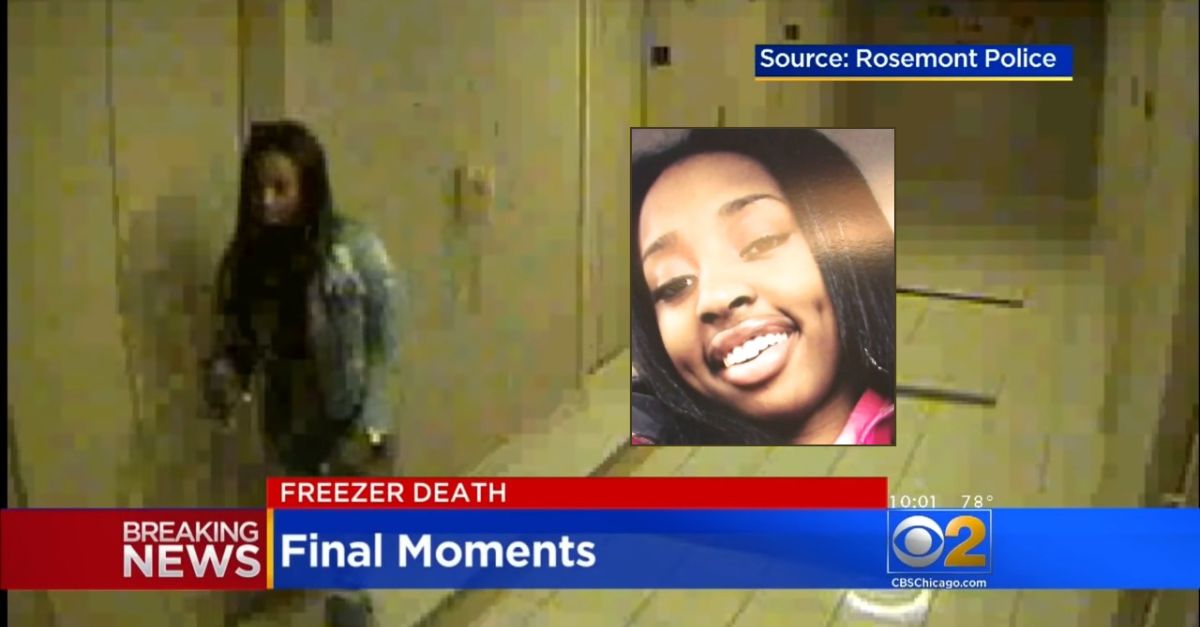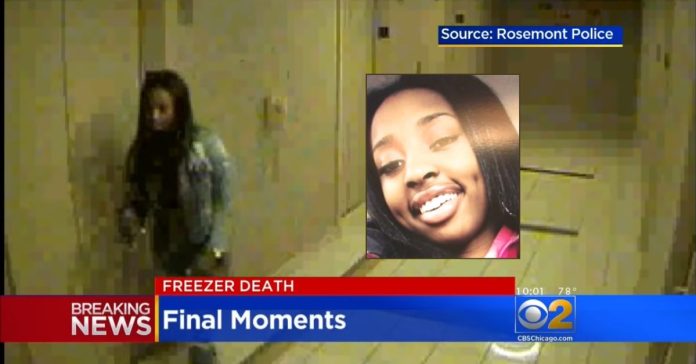
Kenneka Jenkins is seen in her final moments in a Chicago surveillance video before dying in a hotel’s commercial walk-in freezer. (Surveillance video screenshot from Rosemont Police Department via CBS Chicago/YouTube; Jenkins photo from a news conference with the family lawyer)
The family of a 19-year-old woman who suffered “immeasurable conscious pain” as her body shut down and she froze to death in a hotel walk-in freezer outside of Chicago after a night of partying will receive more than $6 million in a wrongful death settlement.
The agreement was made on Tuesday in the lawsuit involving the death of Kenneka Jenkins. Her mother, Tereasa Martin, filed a $50 million lawsuit in 2018. It named the hotel owner and operator, CPO Hospitality LLC, its security staff, and the restaurant responsible for managing the kitchen.
A representative for the hotel did not immediately respond to a request for comment from Law&Crime.
Court documents outline the events that occurred after Jenkins checked into the Crowne Plaza Chicago O’Hare Hotel in Rosemont, some 20 miles northeast of downtown Chicago, for a party on Sept. 9, 2017, at 1:13 a.m. She was last seen alive leaving a room on the ninth floor at 2:30 a.m.
Hotel staff and security received multiple notifications before then about the room she was in. Staff knew there were too many occupants in the room, that a smoke detector had been disabled, and there was a smell of “strong intoxicants” emanating from the room, but they did not intervene or investigate what was happening inside, the lawsuit said. They knew Jenkins was missing at about 2:30 a.m., and hotel staff assured her mother they would check and review all security cameras and footage to locate her daughter.
But they failed to properly review security video — footage which would have shown her whereabouts and would have saved her life, court documents said.
At 3:32 a.m., Jenkins was seen on camera entering a kitchen through the employee door from the downstairs hallway of the hotel, court documents said.
Had staff checked the surveillance footage, they would have seen her enter the kitchen and would have been able to find her, the lawsuit said. From the time her friends last saw her, at around 2:30 a.m., until she was last seen on surveillance footage entering the kitchen around an hour later, she passed several hotel personnel who failed to prevent her from entering the kitchen, the documents said. During that time, she was visibly disoriented and in dire need of assistance, the lawsuit said.
The kitchen contained a double walk-in freezer that was accessible to the public and employees. It had a sticker affixed that was “completely faded and failed to instruct how to release the lock system of the door,” the lawsuit said.
Jenkins’ family went to the police to report her missing after they didn’t hear from hotel staff. At 3:20 a.m., police opened an investigation at the hotel. It wasn’t until the police requested a review of the surveillance video that staff began checking it.
A hotel employee had been in that freezer where Jenkins was at about 10:30 p.m., around 19 hours after she went in, but did not see her, the lawsuit said. Nearly two hours later, after midnight the next day — 35 hours after she had checked in — Jenkins was found unresponsive in the freezer, which had no lights on and a recorded temperature of 10 degrees Fahrenheit, The Chicago Tribune reported, citing the medical examiner.
Her death was ruled an accident. Alcohol intoxication and the use of a drug for treating epilepsy and migraines were cited as “significant contributing factors,” the Tribune reported.
Have a tip we should know? [email protected]

